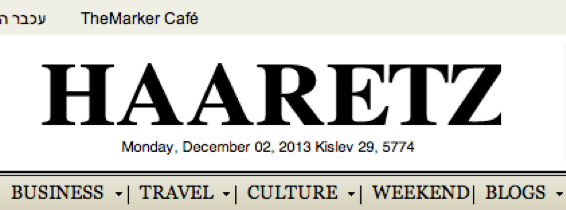
By Brian Schaefer

Approximately two dozen people stood shivering in a park in Boston on Sunday. They sang songs, lit candles and recited prayers in a brief Jewish ceremony to mark the Transgender Day of Remembrance, an annual commemoration of those killed by anti-transgender hate. It would be followed by a larger non-denominational event.
“Anybody who passed by could hear our prayers and words of Torah,” said Chasiah Haberman, the Boston regional manager of Keshet, an organization that advocates for the full inclusion of lesbian, gay, bisexual and transgender people in American Jewish life.
In an era of accelerating rights and recognition for gays and lesbians in the United States, transgender people often still struggle for basic safety. Transgender Day of Remembrance draws attention to murders that have occurred in the past year which, while difficult to confirm, appear to be motivated by hate.
Islan Nettles, 21, was beaten to death in New York in August and Amari White, 22, was shot to death in Richmond, Virginia earlier this month. In both instances, friends and community members insist that the victims’ gender identities were catalysts to the crime. These are just two of dozens of cases commemorated at the remembrance events.
The American-Jewish community has made great strides toward accepting gay and lesbian Jews in recent years, as same-sex marriage gains visibility and support nationwide. Yet transgender Jews – those whose gender identity does not match the biological sex of their birth – have not achieved the same degree of recognition andembrace.
How prevalent is the problem? It’s hard to know. Gender identity, like sexual orientation,can be invisible so a community may not always know when it has transgender members among it. Which is why advocates argue for a proactive approach to creating a welcoming environment. Otherwise, transgender people may choose to remain hidden because, as Transgender Day of Remembrance reminds us, they still face extreme physical repercussions for being out.
For Keshet, the Transgender Day of Remembrance, which occurred on November 20th this year and has taken place each November since 1999, is an opportunity to raise awareness of the issue. The organization encourages Jewish communities to commit to observing the event; this year, over 40 institutions pledged to do so, well up from years past.
Synagogues from San Francisco to New York dedicated Shabbat services this week to transgender awareness, incorporating special readings and prayers into the liturgy and making it the subject of sermons. Temple Beth-Am in Seattle screened “Trans: The Movie,” a documentary offering insight into the struggles and joys of transgender people.
Even the Anti-Defamation League marked the day with a series of Twitter posts calling attention to the issue. “ADL honors the memory of those whose lives were lost in acts of anti- transgender violence,” the organization wrote on Wednesday.
Across the Atlantic, Moishe House London hosted a Shabbat dinner in honor of Transgender Day of Remembrance. Rachel Reid, a founding member of the house, though no longer a resident, helped write the house’s policy two years ago expressing its commitment to being a welcoming space for Jews of all gender identities and expressions.
“You wouldn’t know a new community would welcome you if they don’t explicitly state it,” said Reid: But words, she says, must be supported by action. So she reached out to Surat Knan, the project manager of Rainbow Jews, a year-old initiative to document the history of LGBT Jews in the UK, to plan a special Shabbat gathering in honor of Transgender Day of Remembrance.
“I believe most trans or gender-variant Jews in the UK have experienced pain, insult, abuse and ignorance toward their needs and feelings,” said Knan. “We hope to offer our trans community members on Friday a ‘safe space’ to share their stories and experiences with us.”
In the southern hemisphere transgender Jews feel the same marked by “isolation, exclusion and discrimination,” says Gávi Ansara, an Orthodox man who has led gender and sexuality outreach efforts in Australia, the UK, and the United States. But there was no public Jewish event for the Transgender Day of Remembrance in Sydney, where he lives. “The absence of public Transgender Day of Remembrance events in the Jewish community in Australia is a revealing silence,” he said.
In Colorado last Wednesday, as part of a community-wide, non-denominational eventmarking Transgender Day of Remembrance at a church, Rafi Daugherty – the Keshet regionalmanager in that state – planned to read Jewish text and said he may recite the Kaddish aswell.
The obstacles for greater inclusion in egalitarian Jewish communities are “education andgetting our voices out there,” said Daugherty, who grew up Orthodox and is now a member ofan egalitarian independent minyan. When he came out to his community as transgender, many were surprised but receptive. “The obstacle isn’t insurmountable,” he said.
Still, Daugherty pointed out that discussions of egalitarianism in traditional synagogues isstill limited to a male-female gender binary and rarely expands to include intersex andgender non-conforming Jews.
When seeking resources to open up these discussions, Keshet points congregations to the same ancient texts Jews use to explore every other issue. Keshet’s collection of Trans Texts includes explorations of the Torah andTalmud.
“When you can show places in the Torah where gender is not a binary, people are always amazed. Myself included,” said Daugherty. “Learning that there are words for intersex in Talmud was very exciting and shocking forme.”
Textual examples from the Trans Text project can be found on Keshet’s website here:www.keshetonline.org/resources/transtexts